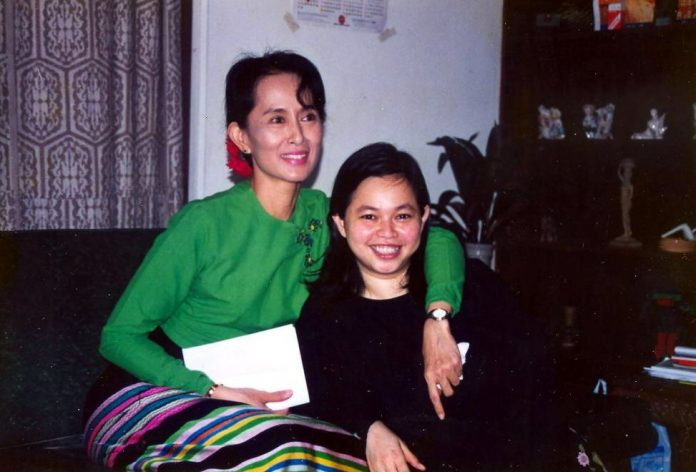Guest contributor
Debbie Stothard
“Don’t forget, my Suu is very human,” Michael Aris told me as he drove me around Oxford to point out various buildings connected to Daw Aung San Suu Kyi.
It was 1998, my first trip to the U.K. to attend a conference in London. Michael Aris invited me up to Oxford for the day. We had been in touch by email, fax and snail mail.
ALTSEAN-Burma was running a clandestine courier system for Daw Suu, codenamed “The Pigeons,” a multinational (and random!) network of activists smuggling in medications, correspondence, and anything else The Lady wanted, ranging from children’s vitamins, campaign badges and books, to silk threads and Star Wars movies. And cosmetics.
In return, we smuggled out letters, audio recordings and video footage, ensuring that her voice and the voices of her colleagues reached international and internal audiences, via media services such as DVB.
Each time we received video and photos of Daw Suu, we would post a set to Michael in Oxford, so he could see how “My Suu” was doing. In a movement where everyone seemed to have a claim on Daw Aung San Suu Kyi, Michael Aris called her “My Suu.”
Most of the Burmese activists I worked with revered her, tried to shield her from bad news and criticism, and feared distressing or angering her. I always thought that she was more disciplined than the generals, but a lot more charismatic and charming.
We were reluctant to ask her tough questions. Her default response would be “No.” However, one just had to persist and go through one’s arguments. If she was convinced, she would change her mind but not tell you. You would only know it when she acted.
In the early days, some of us, when faced with a dilemma, would invoke “WWDSD” – What Would Daw Suu Do? She was our guiding star. This changed. The protective shield of yes-people that formed around her when she entered parliament blinded her from the realities on the ground.
States, politicians, and businesspeople pulled her in different directions according to their agendas. Her denial of the Rohingya genocide, and tolerance for China’s economic projects that hurt so many rural ethnic communities turned our world upside down. This was a different Daw Suu from the one we knew.
I would reflect on Michael’s reminder – that she was human. At that time, I assumed he was referring to her warmth, her cheeky humor, her generous compassion, and thoughtfulness.
We had put her on a pedestal, she was “The Lady” in real life. But she was, and is human. Like all of us she has flaws and makes mistakes, including grievous ones. And we still love her, even though we object to her choices.
At the end of that day in 1998 in Oxford, Michael Aris drove me to the train station and insisted on waiting with me on the platform until I boarded the train to London.
Like a doting uncle, he gave me a warm hug and told me to send his love to “My Suu.” A week later, I was in Rangoon to meet her. Before she could greet me, I said “This is from Michael” and gave her a giant hug. Mission accomplished!
Happy 80th birthday Daw Suu. Hope you felt all those hugs sent to you from all around the world.
Debbie Stothard is a human rights activist from Malaysia and the founder-coordinator of ALTSEAN-Burma, a network of groups based in the regional bloc Association of Southeast Asian Nations (ASEAN) supporting democracy and human rights in Myanmar for the last 30 years.
DVB publishes a diversity of opinions that does not reflect DVB editorial policy. We’d like to hear what you think about this or any of our stories: [email protected]



